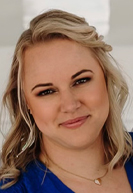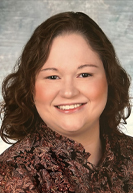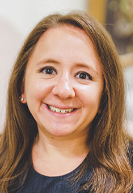Subscriber Benefit
As a subscriber you can listen to articles at work, in the car, or while you work out. Subscribe NowA new group at Indiana University’s McKinney School of Law is helping disabled students find resources to help them be successful and navigate the Indianapolis campus.
Established during the fall 2023 semester, the Accessibility and Equity Student Union is led by president and student MacAna Gilkerson.
The idea to start the group came to her after a co-worker on the East Coast told her about a similar organization they were part of in college.
“I had never even thought of, sort of an organization where disabled individuals could come together and form that sense of community and also share resources,” she said. “So when I came back to McKinney this fall, I was like, ‘you know, why can’t we?’”
The group helps students with disabilities learn what accommodations are available on campus and how to ask for them.

Johannah Anderson found the group helpful when she was looking for parking that accommodates a disability.
She sometimes uses a cane or a wheelchair and needs to park close to her destination.
“The club gave me that resource, gave me that contact,” she said. “And, to have that community, to have people who also have these problems, to have a support system almost that is going through the same thing, and I think that’s also what it needs to grow into.”
While the group is still in its infancy, it’s working to strengthen its outreach to students, staff and faculty with disabilities and those without them who serve as allies to the community.
One way they plan to meet new faces is with an upcoming pickleball clinic, which serves as a way to connect with allies and educate them all while having fun.

“I think we rely on this sort of creating a human sense to people with disabilities,” said Gilkerson, who has a congenital disability. “We can do the fun things, too, if we have the proper accommodations and environment.”
It’s this kind of exposure that Gilkerson believes is important in the community, especially as people with disabilities are becoming more accepted in the spaces they fill.
“I think it’s really coming to prominence now, where people with disabilities are allowed to be out in public or allowed to be in the forefront,” Gilkerson said. “You’re starting to see actors with disabilities come on TV and things like that. We’re starting to be represented. That’s where it’s really important for allies as well as for people with disabilities because it’s part of this new world they’re going to live in.”

Allyship for those with disabilities is growing beyond law school’s campus, according to Jessica Minor, Director of Community Engagement at accessABILITY in Indianapolis.
The Indy branch offers free disability services to help Hoosiers in Marion and surrounding counties with disabilities live independent lives.
They also offer services to help those without a disability accommodate those who have one. Minor herself runs disability justice trainings to accomplish this and is encouraged by the response she’s received.
“People really are coming to us to say, ‘help us do it the right way,’ and ‘What don’t we know?’ ‘What can we learn from?’” Minor said.
Though Gilkerson is graduating this year, she’s looking forward to the strides the group will make going forward and the projects they started this school year that they haven’t quite finished.
She also trusts that she will be leaving the group in good hands, including Anderson who will take on a larger leadership role next year.
Anderson hopes to be a mentor to new law students next school year.
As some who has attention deficit/hyperactivity disorder, she said it’s important that the next class of students gets more help in finding new ways to study and learn that makes sense to them.
“I would love to be that resource, and I guess almost catch people earlier on and be like, ‘Hey, do you want to join this club? We have resources we can help you figure out how to process information in a different way,’” she said.
She said the guidance she’s received so far as a first-year student has been invaluable, and she’s looking forward to instilling the knowledge she’s gained into a new class and helping them get a fair shot at success.
“The goal of adaptive furniture isn’t to make them feel out of place. It’s not to give them something special; it’s to make them able to engage in the environment equally,” Anderson said. “And so I think, my goal for the organization is to do the same thing. Like, how can you help people be in the world equally?”•
Please enable JavaScript to view this content.

